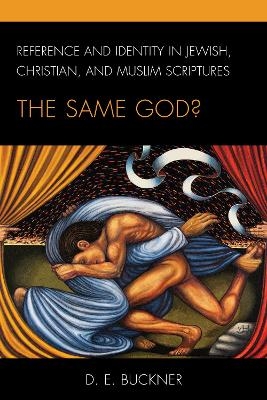
Reference and Identity in Jewish, Christian, and Muslim Scriptures
The Same God?
Seiten
2020
Lexington Books (Verlag)
978-1-4985-8741-9 (ISBN)
Lexington Books (Verlag)
978-1-4985-8741-9 (ISBN)
This book proposes a theory of reference--answering the question of whether Jewish, Christian, and Muslim scriptures refer to the same God--within a semantic framework acceptable to atheists and fideists.
In Reference and Identity in Jewish, Christian, and Muslim Scriptures: The Same God?, D. E. Buckner argues that all reference is story-relative. We cannot tell which historical individual a person is talking or writing about or addressing in prayer without familiarity with the narrative (oral or written) which introduces that individual to us, so we cannot understand reference to God, nor to his prophets, nor to any other character mentioned in the Jewish, Christian, or Muslim scriptures, without reference to those very scriptures. In this context we must understand God as the person who “walked in the garden in the cool of the day” (Gen. 3:8), and who is continuously referred to in the books of the Hebrew Bible and New Testament, as well as the Quran. Further developing ideas presented by the late Fred Sommers in his seminal The Logic of Natural Language, Buckner argues that singular reference and singular conception is empty outside such a context.
In Reference and Identity in Jewish, Christian, and Muslim Scriptures: The Same God?, D. E. Buckner argues that all reference is story-relative. We cannot tell which historical individual a person is talking or writing about or addressing in prayer without familiarity with the narrative (oral or written) which introduces that individual to us, so we cannot understand reference to God, nor to his prophets, nor to any other character mentioned in the Jewish, Christian, or Muslim scriptures, without reference to those very scriptures. In this context we must understand God as the person who “walked in the garden in the cool of the day” (Gen. 3:8), and who is continuously referred to in the books of the Hebrew Bible and New Testament, as well as the Quran. Further developing ideas presented by the late Fred Sommers in his seminal The Logic of Natural Language, Buckner argues that singular reference and singular conception is empty outside such a context.
Dean Edward Buckner taught philosophy at the University of Bristol.
Preface
Introduction
Chapter 1 – Reference statements
Chapter 2 – Rules for Reference
Chapter 3 – Story Relative Reference
Chapter 4 – Mentioning
Chapter 5 – Identification within History
Chapter 6 – Existence
Chapter 7 – Reference and Identity
Chapter 8 – The God of the Philosophers
Chapter 9 – Identification in the Present
Chapter 10 – Revelation
Chapter 11 – Intentionality
Bibliography
About the Author
| Erscheinungsdatum | 10.05.2021 |
|---|---|
| Reihe/Serie | Philosophy of Language: Connections and Perspectives |
| Verlagsort | Lanham, MD |
| Sprache | englisch |
| Maße | 162 x 238 mm |
| Gewicht | 513 g |
| Themenwelt | Geisteswissenschaften ► Philosophie ► Logik |
| Geisteswissenschaften ► Religion / Theologie | |
| Geisteswissenschaften ► Sprach- / Literaturwissenschaft ► Sprachwissenschaft | |
| ISBN-10 | 1-4985-8741-0 / 1498587410 |
| ISBN-13 | 978-1-4985-8741-9 / 9781498587419 |
| Zustand | Neuware |
| Haben Sie eine Frage zum Produkt? |
Mehr entdecken
aus dem Bereich
aus dem Bereich
ein Gegenentwurf zum kurzfristigen Denken : so werden wir zu den …
Buch | Hardcover (2023)
REDLINE (Verlag)
CHF 27,90


